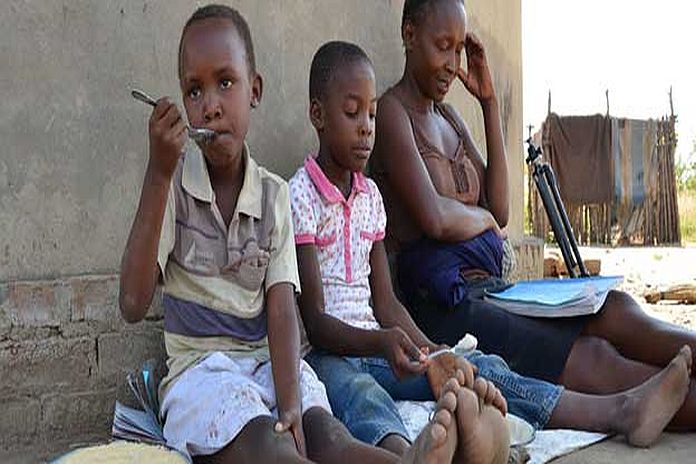Africa, compared to Asia, Europe and the US, has largely escaped the devastating death toll of COVID-19, accounting for a fraction of the world’s 63 million cases.
Instead, the continent has been uniquely affected by the pandemic’s impact on food supply chains, revealing underlying vulnerabilities that threaten to bring a different crisis and leaving the spectre of famine looming over several African countries.
As donors, NGOs and research organisations rally to support governments in preventing a rise in extreme hunger and poverty, we have an opportunity to transform Africa’s food systems for the better at a time when the entire world has reached an inflection point for the sustainability of food systems.
In tackling the secondary impacts of the pandemic, Africa can build greater resilience to global shocks, leapfrogging other regions by reconfiguring a food system that the continent – and the world – has long since outgrown.
This could provide a blueprint for other regions and countries in the run-up to a milestone UN summit in 2021 and help the rest of the world to leverage food and agriculture for better health, climate action and opportunities for equality.
Such a roadmap should start by recognising that the diet, nutrition and health of a population underpins all other indicators of progress and prosperity.
With this in mind, agriculture should be situated at the heart of any national or regional strategy for development and economic growth.
Since it was launched in 2003, the Comprehensive Africa Agriculture Development Programme (CAADP) has set out clear targets for agriculture as a driver of other goals and includes more than 40 countries among its signatories.
As of 2015, public spending on agriculture across Africa under CAADP had increased by more than seven per cent a year to support more and better livelihoods, stronger food security and greater resilience.
It also provides a clear, shared vision around which partners, such as agricultural research networks like CGIAR, can unite to play their part.
Such an integrated, coordinated approach, both between governments and partners, will be essential in delivering the next decade of the programme to accelerate the transformation of African agriculture.
But while a high-level framework like CAADP is crucial for bringing together partners in pursuit of common goals, each country, district and neighbourhood will also need solutions appropriate to their specific contexts.
The world may be connected by its common need to produce sufficient healthy food in a sustainable way, but the means through which this is achieved varies enormously according to social and environmental factors.
Developing more innovations that fit geographical needs will allow food systems to be more responsive, adaptive and impactful.
Over the last 20 years, for example, CGIAR has developed 52 separate innovations across sustainable livestock, crop breeding and natural resource management in Ethiopia alone. By tailoring them to the specific challenges faced by smallholders, women and youth, these solutions have reached an estimated 11 million rural households.
Going forward, initiatives like the Technologies for African Agricultural Transformation (TAAT) program, led by CGIAR and funded by the African Development Bank, will integrate expertise from across research areas to continue to scale up the uptake of appropriate new technologies.
Working in 30 countries, TAAT is forecast to increase raw food production by 120 million tons per year, helping to lift about 40 million people out of poverty, by focusing on national needs across different crops and livestock, and different challenges from crop pests to soil fertility.
Finally, in reforming agriculture, Africa has the opportunity to address systematic and long-term inequality, particularly when it comes to gender inequality.
Women in Africa continue to carry out around 40 percent of agricultural labour yet their frequent exclusion from financial services, land rights and equal opportunities for training holds back Africa’s agricultural development.
CGIAR’s COVID-19 Hub enables researchers to work collectively, while also drawing lessons learned from research across the CGIAR System that can both support the pandemic recovery, and also identify opportunities to close the gender gap.
For example, one study demonstrates the challenges women livestock keepers faced compared to men as a result of a shortage of livestock feed during the pandemic, and offered solutions that could unlock the potential of women, building resilience not only for women but also for their families and their communities.
Arguably, if research into the connected relationship between human, animal and environmental health had been better funded, the world may not be facing today’s COVID-19, health and hunger crisis.
But if there is one lesson to learn, it should be that investing now in agricultural research could help prevent the next disaster, in Africa and around the world.
It is clear now that the needs of a 21st-century food system stretch further than ever, and we must rise to the challenge of redesigning a food system for Africa itself and by Africa for the world.
Kundhavi Kadiresan is Managing Director, Global Engagement and Innovation, CGIAR System Organization. CGIAR (formerly the Consultative Group for International Agricultural Research) is a global partnership that unites international organizations engaged in research about food security.





